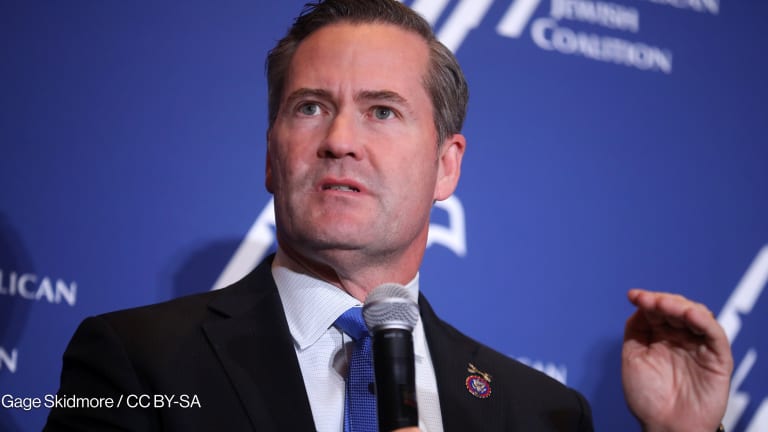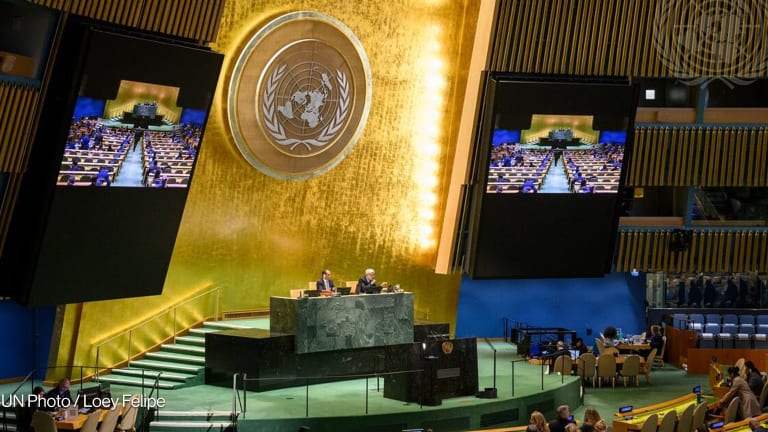
WASHINGTON — A women, peace, and security resolution put forward by Russia was defeated Friday in the United Nations Security Council, a relief to civil society groups that said the text was a dangerous erosion of the 20-year-old agenda.
Civil society called the resolution the weakest on WPS ever considered, and its proposal by Russia, which rarely drafts resolutions, was a cause for suspicion. Instead of advancing the agenda as an additional nine WPS resolutions have done, Russia’s proposal threatened to roll back protection of women’s human rights, prevention of conflict-related sexual violence, and complete and meaningful participation of women in decisions that impact their lives.
Russia, which became president of the U.N. Security Council in October, surprised observers by announcing its intention to put forth a resolution timed to the 20th anniversary of the passage of the original WPS resolution. The landmark Resolution 1325 formally recognized the rights of women in conflict settings, including the rights to participate in peace negotiations and peace building and to be consulted on humanitarian response efforts and post-conflict recovery.
“The strong show of support by two-thirds of the Security Council membership today sends a clear message to the international community that women’s and girls’ human rights will not be traded away in backroom deals and attempts at rolling them back will meet with strong global resistance inside and outside the council,” Vanessa Jackson, United Nations representative for CARE International, told Devex after the vote tally was released.
China, Indonesia, Russia, South Africa, and Vietnam voted for the resolution, while 10 nations abstained, meaning the resolution did not pass. Those who voted against it were Belgium, the Dominican Republic, Estonia, France, Germany, Niger, St. Vincent and the Grenadines, Tunisia, the U.K., and the U.S.
“Today’s vote should signal to Russia and China, as permanent members of the U.N. Security Council, that civil society and other Security Council members alike are committed to the full implementation of the WPS agenda for the next 20 years and beyond,” Jackson said.
While such resolutions are a common occurrence in the Security Council to mark important anniversaries, a commemorative WPS resolution was already passed in October 2019 under the council presidency of South Africa. The announcement that Russia — which voted in support of all 10 WPS resolutions adopted over the last 20 years — would introduce another one this year was “truly shocking,” said Anna Tonelli, Oxfam’s inclusive peace and security lead.
“We have many pieces of evidence … to Russia’s just ongoing displeasure around discussing women’s rights in the Security Council space. They do not believe women, peace, and security is a council issue, and China is very much in line with that as well,” Tonelli said. “There’s been overall a level of frustration around the fact that there has been a resolution put forward because of what is very well understood to be an unfriendly environment for negotiations.”
During the Security Council open debate on the resolution Thursday, the Russian delegate alluded to the controversy, noting how his mission had taken feedback from other missions into account during the drafting process. The resolution went through four separate drafts before becoming the one that was put up for the 24-hour voting procedure starting Thursday.
“There is one alarming trend: Some states seek a monopoly on protecting women’s rights and arrogantly turn down other countries willing to take part in dialogue on ways to improve the status of women, developing conceptual framework, and elaboration of proposals in this area,” said Vassily Nebenzia, permanent representative of Russia to the U.N. “The draft both contributes to consolidation and promotion of women, peace, and security agenda and acts as a well-balanced document that anchors all of its major items.”
Nebenzia also announced Russia’s intention to join the Security Council’s Informal Expert Group on Women, Peace and Security, which was established in 2015.
“We have many pieces of evidence … to Russia’s just ongoing displeasure around discussing women’s rights in the Security Council space. They do not believe women, peace, and security is a council issue.”
— Anna Tonelli, inclusive peace and security lead, OxfamThe U.S. mission remained a wild card throughout the week as civil society tracked how countries on the 15-member council were likely to vote on Russia’s resolution.
The administration of U.S. President Donald Trump has been a supporter of the WPS agenda, passing in 2017 the world’s first comprehensive national WPS law, but has also used U.N. Security Council resolutions to push back against language on women’s reproductive rights. This has moved the council away from the norm of its consensus approach to every country voting affirmatively for thematic resolutions.
“When it came to last year, however, we saw a real split, and this is in large part due to national priorities around women’s rights having shifted, both in terms of the U.S. space, where sexual health and reproductive rights have become a red line in council language, as well as in the more international dynamics and multilateral space around women’s rights being more or less a venue for the council to play out its international politicking,” Tonelli said.
“This year, the U.S. thus far at least has been less problematic in terms of references to full implementation and … this resolution isn’t specifically calling for [sexual health and reproductive rights]. That was something that member states understood to be a very clear red line for the U.S.”
The 20-year-old WPS agenda continues to face challenges in implementation, which is ultimately up to member states. Between 1992 and 2019, only 13% of peace negotiators, 6% of mediators, and 6% of peace agreement signatories in major peace processes were women, according to Tonelli.
“This agenda is really, really important because we are seeing more and more protracted conflicts happening around the world, whether it's Syria or Yemen or South Sudan or [the Democratic Republic of the Congo],” Jackson said. “One of the critical reasons why peace agreements are failing is that women are not meaningfully involved in that decision-making process. They’re not at the formal table with direct voice.”
Zarqa Yaftali, an Afghan women’s rights activist, spoke on behalf of the NGO Working Group on Women, Peace and Security during Thursday’s open debate. She urged continued support from the international community for women peace builders in her country.
“Twenty years of commitments and resolutions by this Council have not changed the reality for women in Afghanistan,” Yaftali said. “Although Afghan women have for too long suffered from war, we are not victims — we have fought back for decades for our rights, and we will not sit by and watch our achievements be thrown away. It is your responsibility as the international community to ensure that you do not either.”








